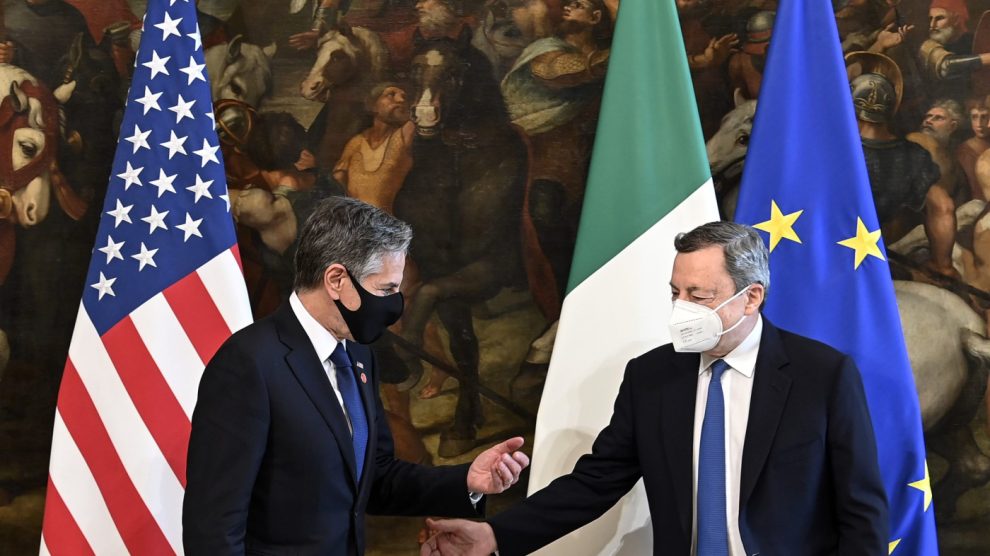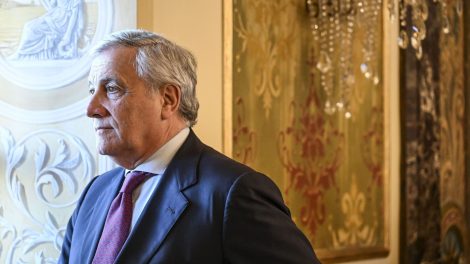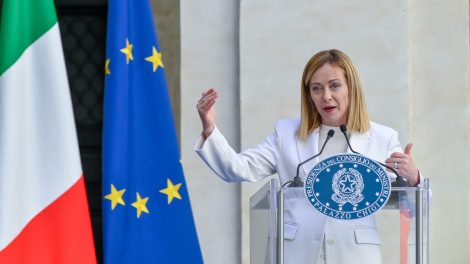Mario speaking. On Wednesday, US Secretary of State Antony Blinken had a telephone conversation with Italian Prime Minister Mario Draghi to thank him for “his exemplary leadership during one of the most challenging periods in recent history and for Italy’s strong support for Ukraine,” as the State Department spokesman, Ned Price, wrote.
- Mr Blinken “underscored the importance of maintaining solidarity and resilience in the face of Russia’s efforts to use energy and other means to divide countries that support Ukraine.”
Future-proofing. The head of US diplomacy also emphasised the US’ “commitment to working with the next Italian government on the broad range of our shared interests.” Likely a nod to Giorgia Meloni’s Brothers of Italy, the party leading the polls, and Adolfo Urso, BoI senator and head of Parliament’s Intelligence Committee, who just returned from visiting Washington.
The Russian funding dossier. Meanwhile, Italian politics is in turmoil because of a US intelligence report detailing how the Kremlin spent $300 million “to shape foreign political environments in Moscow’s favour.” It’s unclear if PM Draghi and Secretary Blinken touched upon the issue. Although they probably did, given that the news came from a senior State Department official and that a conversation between a foreign minister and a resigning head of government is not customary.
- That resignation was the result of parliamentary pressure (led by the Five Stars Movement, the League and Forza Italia, the closest parties to Vladimir Putin’s Russia) and spelt good news for the Kremlin.
- Russia, in turn, has been influencing Western politics by financing organisations and associations, as explained in a two-year-old report by the Alliance for Securing Democracy, where Matteo Salvini’s League also made an appearance.
Someone’s going to talk about it, though. That’s Undersecretary Franco Gabrielli, who oversees intelligence and cybersecurity operations, and he will certainly speak about the State Department report at a hearing with Parliament’s Intelligence Committee on Friday.
- “It is useful that both the Italian government and our Parliament are informed as soon as possible,” said Mr Urso to Corriere della Sera upon his return from Washington. “We are objectively in a very delicate moment, we still have at least a week of electoral campaigning, and we must avoid fueling polemics or campaigns of denigration that play into the hands of our adversaries.”
- That’s “precisely what Russia and China are aiming at,” he added. “Namely, undermining our citizens’ trust in our institutions, in the democratic process, in our parties.”
Lingering suspicion. Repubblica – quoting “a very authoritative source, with direct knowledge of the facts, who discussed the matter with the State Department’s top management” – wrote that Italy is indeed cited in the US dossier on Russian corruption around the world.
- “We won’t get into specific intelligence information,” a State Department spokesperson told the newspaper, “but we have been clear about our concern about Russia’s activity to influence the democratic process in several countries around the world, including the United States. Our concern about Moscow’s activity in this regard is not about one country, but is global in nature as we continue to confront its challenges against democratic societies.”
- The source then clarified the strategy as follows: “Russia’s covert political influence represents a major challenge to the US and other democracies around the world. We have worked to expose it as we uncover it. We have, and will continue to work with our allies and partners around the world, to expose Russia’s malign influence efforts and help other countries defend themselves against this activity.”
- As for speaking out the names of the supposedly corrupted, “we have no further information to discuss specific countries on this issue.” And “this is a deliberate decision,” Mr Price explained, because it’s essential to expose Moscow’s threat globally at this very moment. However, the intelligence community will work discreetly with the details of the individual countries involved.





